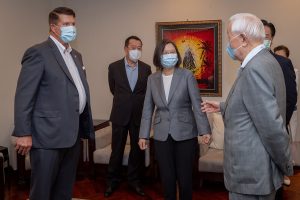The world’s largest free trade agreement was signed on Sunday and includes 15 Asia-Pacific nations. Taiwan is not among them. But the country has reasons for optimism in its quest to forge international trade accords despite its ongoing formal diplomatic isolation.
The Regional Comprehensive Economic Partnership (RCEP) includes all 10 ASEAN members along with Australia, New Zealand, Japan, South Korea, and China. The latter’s presence in RCEP, Taiwan’s Foreign Ministry said Sunday, all but eliminates any chance of Taipei joining the free-trade pact.
But Taiwan is active in Washington this week, participating in multiple dialogues that could lay groundwork for a long-discussed free trade agreement with the United States.
Taiwan and the United States held talks on Tuesday centered on overseas infrastructure investment, opening a series of meetings on economic issues involving a Taiwanese delegation led by Deputy Minister of Economic Affairs Chen Chern-chyi.
Chen is scheduled to participate in the inaugural Taiwan-U.S. Economic Prosperity Partnership on Friday. It will be led by U.S. Undersecretary of State Keith Krach, who traveled to Taiwan in September and signed a cooperation agreement under which this week’s meetings are being held.
Chen is expected to sign a memorandum of understanding at Friday’s event on bilateral economic cooperation, part of talks Taiwan’s Economic Ministry says will encompass global health care, supply chain security, energy development, and 5G network development, along with infrastructure investment.
Taiwan’s Foreign Ministry also said Sunday it will continue its push to join the Comprehensive and Progressive Agreement for Trans-Pacific Partnership (CPTPP), an agreement that evolved from the abandoned Trans-Pacific Partnership (TPP) after the U.S. withdrew from that accord.
Taiwan has campaigned for support from Japan, which shepherded the push to salvage the pact after the U.S. pulled out, for its inclusion in the CPTPP. After a 2018 referendum reinforced a ban on importing agricultural products from Japan’s Fukushima region, Taiwan has attempted to work around this ban by lowering tariffs on some agricultural products. Some Japanese officials have since expressed support for Taiwan becoming part of the pact.
Former Australian Prime Minister Malcolm Turnbull said last month he supports an Australia-Taiwan free trade agreement and Taiwan’s inclusion in the CPTPP at a virtual forum that was also attended by Taiwan President Tsai Ing-wen.
Most attention, however, has focused on Taiwan’s trade relationship with the U.S., especially as officials had taken steps to make progress on a Taiwan-U.S. trade pact before President Donald Trump lost his re-election bid to President-elect Joe Biden.
In August, Tsai said Taiwan would ease restrictions on U.S. pork and beef imports that had been seen as the primary obstacle to a trade agreement between the two countries. Taiwan had blocked imports of some meat products containing ractopamine, a feed additive that is banned in most countries.
Republican Representative Michael McCaul told Reuters in September a trade deal with Taiwan is “very much” on the radar screen of the Trump administration. Days later, a group of 42 Republican and eight Democrat senators called for Trump to start negotiating a bilateral trade agreement with Taiwan.
Even if Taiwan may be pushing to forge a trade pact with Trump officials, there are signs a Biden administration will be supportive of further trade negotiations with Taiwan.
In August, Biden foreign policy advisor Antony Blinken tweeted his approval of Tsai’s move to lift restrictions on pork and beef imports, calling it “good for American farmers, ranchers, and our economy.”
“Stronger economic ties with Taiwan also support our shared democratic values and our common commitment to regional peace and stability,” Blinken added.
Blinken, who is rumored as a candidate to be Biden’s national security advisor or secretary of state, recently spoke with Bi-khim Hsiao, Taiwan’s de facto ambassador to the United States, indicating that a Biden administration will likely retain robust U.S. support for Taiwan.

































